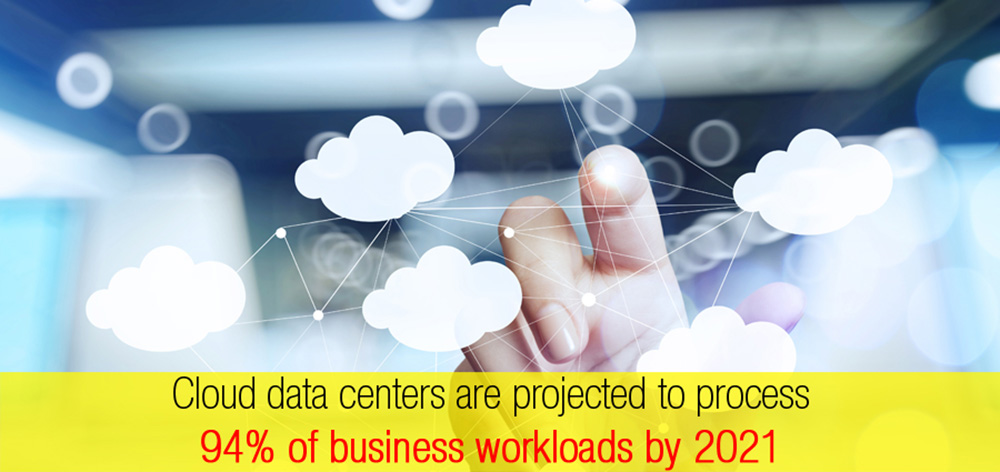Over the past couple of years, there has been a lot of talk about cloud computing. What started off as a fleeting technology has now become a multi-billion dollar industry, with titans like Microsoft Azure and Amazon Web Services providing services to approximately 3.6 billion users worldwide. Believe it or not, around 45% of the world’s population has accessed some form of cloud computing over the past year.
Needless to say, this trend has major implications for businesses, workforces, and societies around the world. Whether end-users realize it or not, almost everything in their digital world is now connected to the cloud in one way or another. More importantly, cloud computing is set to become even more pervasive as technology giants and scrappy startups continue to invent new ways to organize, process, and present information remotely.
To highlight the exciting future of cloud computing, let’s dive into the impacts that this revolution in information technology will have on businesses, workforces, and societies alike.
Impact on Businesses
Whether or not you realize it, if you’re in business today then you’re also in the business of cloud computing. Cloud data centers are projected to process 94% of business workloads by 2021. This rapid transition is affecting all areas of business, from frontline employees to C-suite executives and everyone in between. Key impacts that cloud computing will have on businesses in the near future include:

- Improved Communication: The ubiquitous adoption of cloud infrastructure offers affordable and convenient business communication frameworks that may have been unavailable to some businesses in the past. Through the power of cloud computing, user-friendly video conferencing with remote employees, access to built-in call screening, and other useful features become obtainable advantages for any business.
- Secure Collaboration: While traditional software suites rely on users to keep their systems up-to-date, cloud computing shifts this responsibility to vendors alone. Industry experts agree that cloud-based software is more secure than traditional solutions. This allows businesses to focus more on maximizing their potential and less on hidden security threats.
- Optimized Customer Experience: With cloud computing, businesses can instantly access valuable information that helps them better serve their customers. Cloud solutions can directly connect businesses to customers through self-service portals and similar solutions. More importantly, businesses are empowered to offer optimized customer service and personalized digital interactions, which improves the overall customer experience.
Clearly, the future of cloud computing is set to offer impressive benefits to businesses around the world. Along these same lines, cloud-based software is sure to positively impact individual employees and entire workforces as well.
Impact on Workforce
The backbone of every business is its workforce. While economists have been predicting the impacts of automation for years, it’s safe to say that employees will still play a critical role in future business success. To this end, it’s worth highlighting a few of the notable benefits that cloud computing provides workforces:
- Empower IT Professionals: Utilization of cloud-based systems provides the added benefit of empowering employees to make the most of their unique talents. For technical experts, enterprise-wide adoption of cloud solutions helps to ease the strain on in-house IT teams. As a result, IT professionals are able to focus on key business objectives, instead of having to dedicate countless hours to tedious help desk tasks.
- Flexible Workflows: Cloud technologies empower all employees to work on alternative devices (think tablets and smartphones) without fear of losing data. Flexible workflows like this are especially useful in today’s world, where work-from-home is becoming the new normal. The adoption rate of cloud-based technologies for video conferencing and remote collaboration has increased in recent months. Looking forward, cloud computing will only become more important.
- Increased Employee Satisfaction: While it may sound cliche, it’s been proven that happy employees are productive employees. Workforces that utilize cloud computing enjoy a host of benefits, which have the potential to increase employee satisfaction in the workplace. This gives workers the freedom to leverage their creativity, while at the same time helping employers to reduce turnover.

At the end of the day, employee attitudes and productivity can make or break the future of a company. While cloud computing wasn’t developed to improve employee sentiments, it provides several upsides that naturally benefit the workforce.
Impact on Societies
The rapid growth of cloud computing is a natural extension of modern innovations. Technology experts anticipate that in the future, cloud computing will pair with 5G connectivity, the internet of things (IoT), and big data to completely redefine how people go about their daily lives. At the risk of sounding like a science-fiction novel, here are some of the exciting impacts that these technology pairs will have on societies around the world:
- Ubiquitous Computing: 5G, cloud computing, and improvements in electronics manufacturing will likely combine to enable a world with ubiquitous computing. In the future, each and every item could include some level of computational power. If implemented, this paradigm will provide users with unlimited possibilities.
- Democratized Education: Thanks to cloud-based education platforms like Coursera, students from industrialized nations now have the ability to access classes at any time and from anywhere. In the future, improvements in global connectivity will further democratize education, enabling students in developing countries to receive a high-quality education regardless of socioeconomic status.
- The Rise of Digital Nomads: The concept of the digital nomad is centered on the idea that people can leverage advances in computing technologies to live, work, and play from anywhere in the world. As remote work gains widespread acceptance, an increasing number of people are expected to transition to this futuristic lifestyle.

These trends highlight the disruption created by cloud computing and related technologies. While the future is uncertain, rest assured that the continued rise of cloud computing will provide many benefits to businesses, workforces, and societies alike. The benefits highlighted above are only a few of the exciting developments that will come to pass. One thing is for certain: there’s no better time than today to adopt cloud computing in your business, workforce, or personal life.
Dr. Gaddam is a seasoned entrepreneur, angel investor, and author. Dr. Gaddam’ s greatest accomplishment lies in raising ERP Analysts, Inc. from a two-person organization to eighty-five-million-dollar firm. ERP Analysts, Inc. has been recognized as one of the fastest-growing companies by Inc. 5000 for ten years, Deloitte Fast 500, & Business First Fast 50 for several years. ERP Analysts is recognized as a “Best Places to Work” in Ohio for several years (www.erpagroup.com). Dr. Gaddam graduated the Doctor of Management (DM) from Case Western Reserve University, MBA from the Ohio State University, and the Owner President Management program (OPM 43) from Harvard Business School. He is the author of the book “Destination Success: Discovering the Entrepreneurial Journey” and also co-author of “Roadmap to Success,” with Deepak Chopra, Ken Blanchard, and other entrepreneurial leaders.





